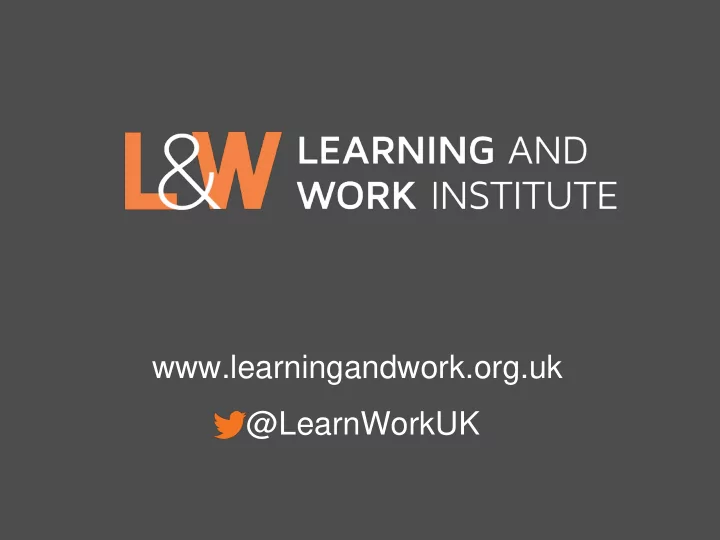

www.learningandwork.org.uk @LearnWorkUK
The Workplace and Basic Skills: Opportunities for Adult Literacy English, Maths and ESOL Annual Conference - 3 rd November 2016 Alex Stevenson Head of English, Maths and ESOL, Learning and Work Institute alex.stevenson@learningandwork.org.uk @LWalexs Dr Sam Duncan Senior Lecturer in Adult Education and Literacies, UCL Institute of Education sam.duncan@ucl.ac.uk
‘Starter for 10’… • There isn’t so much ‘workplace basic skills’ provision going on nowadays. • I’m currently involved in offering workplace adult literacy learning. • There are real barriers to organising adult literacy learning in the workplace.
Workshop Objectives • Explore the potential relationships between adult literacy development and places of work • Provide an update on opportunities for workplace basic skills within the current policy context • Share insights from recent research in England, and from Europe, into the impact of what are sometimes called ‘poor basic skills’ in the workplace, and the implications for practice • Enable participants to share current practices and challenges, and identify future opportunities to develop workplace basic skills, using adult literacy approaches.
What are all the possible relationships between literacy/Basic Skills development and ‘the workplace’?
• That the desire to get a certain job or progress in a job could motivate someone to want to develop their skills? And so join a course?
• That certain kinds of jobs are connected with certain kinds of literacies or certain literacy/basic skills demands?
• That to gain a certain job, or gain the qualification or certificate you need to get that job, may require certain levels of literacy/basic skills, even if the job itself doesn ’ t ?
• That you may develop your basic skills while doing the job, with others? And/or as the role changes? (so the workplace is a common location of informal literacy development/learning)
• That some workplaces may offer formal/non- formal literacy/basic skills class for their employees, at the workplace? In the working day? As part of paid time?
• That some workplaces may send staff off on basic skills (or other) courses outside of the workplace as a form of staff development? (and many courses of all kinds may actually be developing literacy/basic skills?)
Anything else?
• And I’d also like us to remember that the work place isn’t the only motivator for development of skills or location of adult informal development of skills (there is more to adult life than work, and this goes for literacy/basic skills use, development and motivation too).
“Through work people can, in principle, maintain and develop their skills [...] So the workplace when combined with education can offer significant potential for young people to develop basic skills. It provides meaningful learning alternatives to students who are more practically oriented, and often facilitates entry to the labour market.” Building Skills for All (2016 )
• Research on skills mismatches - European Survey of Skills and Jobs (CEDEFOP, 2014)
Research and Policy Developments – An Opportunity? Developments in learning and skills policy in England – greater employer emphasis e.g. • Introduction of traineeships and work experience element of 16 – 19 study programmes • 3m apprenticeships target and introduction of apprenticeships levy on employers • ‘Employer - focused’ consultation on the reform of Functional Skills English and Maths qualifications and national standards • A devolved Adult Education Budget by 2018/19
BIS Research Project Impact of Poor Basic Literacy and Numeracy on Employers http://dera.ioe.ac.uk/25449/1/BIS-16-36- impact-of-poor-basic-literacy-and-numeracy-on- employers.pdf
Motivation? Wider sense that ‘poor’ literacy and numeracy skills of employees has an impact on the employer- but very little research on this. Complex to define and measure. Design? Mixed methods: survey of around 4000 employers around England and qualitative case study of 9 employers (interviews with different levels of staff)
12% of employers identify a literacy and/or numeracy lack, with more identifying a literacy gap than a numeracy Only about 3% reported deficit in both. BUT
Situation made complex by the fact that employers may not have a strong sense either of employees skills or of the literacy and numeracy demands of particular roles. (and may be further complexity around literacy and English language or language variety issues)
The Case Studies suggest that: • Employers may not have strong sense of literacy and numeracy demands of various roles • Employers and employees may not have clear sense of what is a literacy or numeracy practice (overlaps with ICT skills, filing/office skills and more general communicative skills) and so identifying lacks is even more complex. • Most employers don’t specific particular literacy or numeracy standards for jobs, though some do their own tests at recruitment and some may see certain other qualifications as giving us information on literacy or numeracy skills
• Employees often work collaboratively to get support with literacy and numeracy tasks • Employees often do tasks for each other to work to their own strengths • Employers value oral communication skills most highly • Management may notice issues but may not associate these with ‘basic skills’ or ‘literacy/numeracy’ • Issues may arise when jobs shift (ie increased use of email with clients)
Learning from Europe ...
STRAIGHTEN Basic Skills Project • ERASMUS+ project 2014 – 2017 • 6 partners – UK, Austria, Germany, France, Romania, Norway – sharing similar concerns about work-related basic skills • Four outputs: 1) Success Indicators Synthesis 2) Country Reports 3) Country Experiments (including practitioner training) 4) European Roadmap for effective delivery of work-related basic skills
Discussions • What are the current practices, opportunities and challenges in providing opportunities for adult literacy in the workplace, in your context? • What changes in policy would support you to offer more and/or different provision in this area? What else would support you to do this? • What actions could you – or would you like to - take to develop workplace adult literacy opportunities? • Any other thoughts arising from today’s session?
Recommend
More recommend